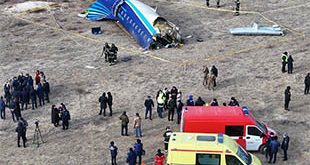
Washington, United States | AFP | A recap of key developments in Israeli-US relations, after President Donald Trump on Wednesday recognized Jerusalem as Israel’s capital in a major break with his predecessors.
– Recognition, despite divergences –
On May 14, 1948, David Ben Gurion founds the Jewish state of Israel, after the British mandate ends in Palestine. The administration of US president Harry S. Truman recognizes the state 11 minutes after it is proclaimed.
However, relations are troubled in the first few years of the new state.
The administrations of both Truman and Dwight D. Eisenhower realize that too close a rapprochement with Israel risks harming US relations with the Arab world.
Washington thus voices strong opposition to the Israeli campaign against Egypt in 1956, launched in coordination with France and Britain and known as the Suez Crisis. Under US pressure, Israel withdraws from the Sinai.
– Solid support for Israel –
During the June 1967 Arab-Israeli war, Israel occupies the Sinai, the Gaza Strip, the West Bank, east Jerusalem and the Golan Heights.
The Six-Day War is a turning point for the US, which becomes Israel’s main backer.
In October 1967, president Lyndon B. Johnson decides to order large-scale deliveries of arms to Israel.
On several occasions Washington attempts to match its role as Israel’s main backer with that of mediator in the Israeli-Palestinian conflict.
– Years of mediation –
In September 1978, president Jimmy Carter brings together Israeli Prime Minister Menachem Begin and Egyptian president Anwar Sadat at Camp David, the US president’s country retreat. The subsequent Camp David Accords pave the way for a peace treaty signed the year after by Egypt and Israel.
On September 13, 1993 president Bill Clinton orchestrates the historic handshake in Washington between Israel’s prime minister Yitzhak Rabin and Palestinian leader Yasser Arafat, after they sign a five-year transitional agreement on Palestinian self-government in Gaza and the West Bank.
In 2000, Clinton blames Arafat for the failure of peace negotiations at Camp David from July 11-25.
– Obama: tensions, but aid –
After they respectively take office in 2009, relations between US president Barack Obama and right-wing Israeli prime minister Benjamin Netanyahu come under deep strain.
In June Obama calls on Israel to stop settlement building in the occupied territories and expresses his commitment to a Palestinian state alongside Israel.
In March 2010, Israel’s authorization of the construction of 1,600 houses in a settled neighborhood in east Jerusalem, during a visit by US Vice President Joe Biden, sours relations.
In March 2015, Netanyahu defies Obama, secretly arranging to address a joint meeting of the Republican-controlled US Congress where he openly tries to scupper the agreement between Iran and world powers on Tehran’s nuclear program. Obama refuses to meet him during his stay in Washington.
In September 2016, however, the two leaders sign a deal on $38 billion in military assistance for the 2019-2028 period, the most generous military aid in US history.
In December, relations degenerate again after the United States — for the first time since 1979 — refrains from vetoing a UN Security Council resolution condemning Israel’s settlement building.
– ‘Unbreakable’ bond with Israel –
On January 20, 2017, Netanyahu says he wants relations with the United States to be “stronger than ever” with Donald Trump as president.
On February 15, Trump warmly welcomes Netanyahu to the White House and hails the “unbreakable” bond between their countries.
Trump backs away from Washington’s quest for a two-state solution to the conflict, saying he would back a single state if it led to peace.
On May 15, David Friedman, the controversial new US ambassador to Israel who has been a strong supporter of Israeli settlement building in the West Bank, arrives.
On May 22, Trump becomes the first sitting US president to visit the Western Wall in Jerusalem. A day later Netanyahu announces that Israel will receive an extra $75 million in US military aid. And in September Israel inaugurates with its US ally a joint air base, the first on Israeli territory.
On December 6, Trump recognizes Jerusalem as Israel’s capital and orders a plan for the US embassy to move there. He stresses, however, that Washington backs a two-state solution to the Palestinian problem.
 The Independent Uganda: You get the Truth we Pay the Price
The Independent Uganda: You get the Truth we Pay the Price


